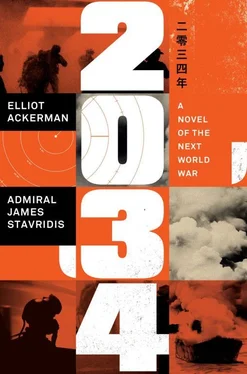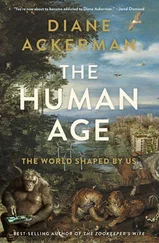“To the citizens and government of the People’s Republic of China, I wish to speak to you directly: Through your cyber weapons you have degraded our ability to offer a more conventional, measured response. The path of war is not one we wish to travel, but if forced, travel it we will. We will honor our commitments to our allies. Turn your ships around, return them to port, respect the freedom of navigation of the seas, and catastrophe may still be avoided. However, a violation of Taiwan’s sovereignty is a red line for the United States. A violation of that red line will be met with overwhelming force at a time and place of our choosing. To stand with our allies and to stand up for ourselves, I have preauthorized the employment of select tactical nuclear weapons to our commanders in the region….”
Wedge turned off the radio.
Traffic was flitting by them on I-95. Here and there, cars had pulled over on the shoulder with their hazard lights flashing into the darkness. Inside, Wedge could see the silhouettes of drivers and passengers leaning forward, listening attentively to the address on the radio. Wedge didn’t need to hear anything more. He understood what was coming. The master sergeant muttered, “Jesus, tactical nukes,” and then, “I hope they’ve got their shit wired tight at the White House.”
Wedge only nodded.
They drove a bit more in silence.
Wedge glanced down on his lap, to where he held the red binder with the citation for his Prisoner of War Medal, as well as the blue box that contained the decoration itself.
“Let’s see that medal of yours, sir,” said the master sergeant.
Wedge opened the box.
It was empty.
Neither he nor the master sergeant knew quite what to say. The master sergeant sat up a little bit straighter in his seat. He affixed his hands firmly at ten and two o’clock on the steering wheel. “No big deal,” he muttered after a moment, glancing once more into the empty box that rested on Wedge’s lap. “There must’ve been an oversight today at the White House. Tomorrow, we’ll unfuck it.”
4

Red Lines
01:46 May 22, 2034 (GMT+2)
Barents Sea
For the third night in a row, Farshad struggled to sleep. His cabin was right above the waterline and he could hear the ice floes glancing off the bow, hitting like the tolling of a bell— dong, dong, dong. All through the night, the noise was relentless. When he had arrived in Tartus weeks before, a set of orders had awaited him. He wouldn’t be assigned to liaison duties there, with the Russian Federation’s short-sleeved, sun-bronzed Mediterranean Fleet, but far to the north with its Baltic Fleet. When he had stepped off the plane at naval headquarters in Kaliningrad, he didn’t even have a winter coat. He assumed headquarters would assign him to one of the larger command ships, the Kuznetsov , or perhaps the battle cruiser Pyotr Velikiy . Instead, he found himself aboard the corvette Rezkiy , which rolled incessantly. Farshad found himself mildly seasick aboard this fast little tin can of a ship with its thin sides.
Dong, dong, dong—
He gave up and switched on the light.
His bed was cantilevered to the bulkhead of his cabin, which was so small that he couldn’t open his door until he stowed the bed, and he couldn’t stow the bed until he stripped it of its wool blanket, sheets, and pillow. This multistep process of putting away his bed, to open his door, to leave his cabin, was one of the myriad humbling routines that composed his life as a relatively junior liaison officer. Another was taking his meals in the cramped wardroom among his fellow officers, few of whom spoke anything but Russian and all of whom were at least a decade younger. This had caused Farshad to eat mostly between meals, or to eat midrats , which were the day’s leftovers placed out at around midnight by the messmen.
Over his pajamas he shrugged on his peacoat, a gift from a kindly supply orderly in Kaliningrad. The incessant noise of the ice floes banging off the hull kept him company as he padded down the red-lit passageway, staggering between the ship’s steel bulkheads, toward the wardroom where he hoped to scrounge a bite to eat.
Like Farshad’s room, the wardroom was an exercise in spacial economy. It was no more than a two-table banquette with a small galley attached. Sitting at the banquette was Lieutenant Commander Vasily Kolchak, the Rezkiy ’s executive officer. He was nursing a cup of tea tapped from the wardroom’s samovar. A cigarette receded toward his knuckles as he read from a laptop. Behind him was the room’s only adornment, an aquarium populated by yellow-orange fish who poked their eyes from a novelty shipwreck at its bottom. The messmen had already laid out the midrats in two stainless-steel vats, one filled with a dark-colored meat in a brown sauce and the other filled with a light-colored meat in a white sauce. A placard sat next to each dish, but Farshad couldn’t read Russian.
“The white one is fish, some type of herring, I think,” said Kolchak in English, glancing up from his laptop. “The dark one is pork.”
Farshad paused for a moment, hovering over the two options. Then he sat across from Kolchak with an empty plate.
“Good choice,” said Kolchak. The only other sound was the aquarium filter running in the corner. He wore a gold signet ring on his right pinky. With his left hand he played nervously with the blond, almost snow-white hair that brushed the tops of his ears. His small, shrewd eyes were cold and blue, their color slightly faded like two precious stones that had been cut generations ago. His nose was long, sharply pointed, and red on its tip; it seemed as though Kolchak was battling a cold. “I don’t imagine you’ve seen the news,” he said to Farshad. Kolchak’s English accent sounded faintly British and old-worldly, as if Farshad were eavesdropping on the conversational mores of a previous century.
Kolchak clicked on a video from his laptop. The two of them listened to an address made a couple of hours before by the American president. When the video cut out, neither of them spoke. Finally Kolchak asked Farshad about his missing fingers.
“Fighting the Americans,” he explained. Farshad then pointed to Kolchak’s signet ring, which at a closer inspection he could see was adorned with a two-headed eagle. “And your ring?”
“It was my great-great-grandfather’s. He was also a naval officer, the Imperial Navy.” Kolchak took a long drag on his cigarette. “He fought in our war with Japan. Then the Bolsheviks killed him when he was an old man. This ring remained hidden in my family for many years. I’m the first to wear it openly since him. Time changes everything.”
“What do you think the Americans will do?” asked Farshad.
“I should ask you,” answered Kolchak. “You’ve fought against them before.”
This slight gesture of deference caught Farshad off guard. How long had it been since someone had sought out his opinion? Farshad couldn’t help it; he felt a certain measure of affection for Kolchak, who, like him, was the loyal son of a nation that had not always treated him or his family fairly. Farshad answered Kolchak by saying that American presidents had a mixed history when it came to the enforcement of self-imposed “red lines.” He wondered if the United States would be willing to resort to nuclear weapons—even tactical nuclear weapons, as the president had suggested in her remarks—to prevent the Chinese from annexing Taiwan. “The United States was once predictable; not so much anymore,” concluded Farshad. “Their unpredictability makes them very dangerous. What will Russia do if the United States acts? Your leaders have a great deal to lose. Everywhere I look I see wealthy Russians.”
Читать дальше













